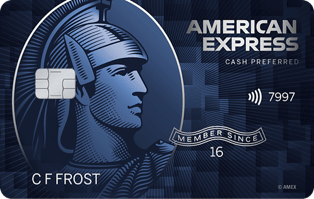- myFICO® Forums
- FICO Scoring and Other Credit Topics
- Understanding FICO® Scoring
- Re: 792 -> 775 from reducing balance
- Subscribe to RSS Feed
- Mark Topic as New
- Mark Topic as Read
- Float this Topic for Current User
- Bookmark
- Subscribe
- Mute
- Printer Friendly Page
792 -> 775 from reducing balance
Is your credit card giving you the perks you want?
Browse credit cards from a variety of issuers to see if there's a better card for you.
- Mark as New
- Bookmark
- Subscribe
- Mute
- Subscribe to RSS Feed
- Permalink
- Report Inappropriate Content
792 -> 775 from reducing balance
Ok, I get it. Lowering your utilization can sometimes drop your score. I understand that.. but.. 17 points? **bleep**? I had a balance of $342.00 on my BCP which put me at 1% utilization. I decided to pay it off completely, and it dropped my Experian score by 17 points from 795 down to 775. That's ridiculous. Why so much?
- Mark as New
- Bookmark
- Subscribe
- Mute
- Subscribe to RSS Feed
- Permalink
- Report Inappropriate Content
Re: 792 -> 775 from reducing balance
@DomLS3 wrote:Ok, I get it. Lowering your utilization can sometimes drop your score. I understand that.. but.. 17 points? **bleep**? I had a balance of $342.00 on my BCP which put me at 1% utilization. I decided to pay it off completely, and it dropped my Experian score by 17 points from 795 down to 775. That's ridiculous. Why so much?
The only time lowering your utilization would lower your score would be where it led to all your cards reporting at zero. FICO 8 for some strange reason prefers one card reporting a small balance, to none reporting a balance. Don't ask me why. It's ridiculous IMHO.































Total revolving limits 568220 (504020 reporting) FICO 8: EQ 689 TU 691 EX 682
- Mark as New
- Bookmark
- Subscribe
- Mute
- Subscribe to RSS Feed
- Permalink
- Report Inappropriate Content
Re: 792 -> 775 from reducing balance
- Mark as New
- Bookmark
- Subscribe
- Mute
- Subscribe to RSS Feed
- Permalink
- Report Inappropriate Content
Re: 792 -> 775 from reducing balance
The magnitude of the score change may be partially due to rebucketing.
You are in a higher scoring bracket above 760, and changes can result in movement to a different scorecard.
That means scoring in that category is being done under a new algorithm, resulting in lack of direct comparison of impact based on a given change.
- Mark as New
- Bookmark
- Subscribe
- Mute
- Subscribe to RSS Feed
- Permalink
- Report Inappropriate Content
Re: 792 -> 775 from reducing balance
@RobertEG wrote:The magnitude of the score change may be partially due to rebucketing.
You are in a higher scoring bracket above 760, and changes can result in movement to a different scorecard.
That means scoring in that category is being done under a new algorithm, resulting in lack of direct comparison of impact based on a given change.
I agree with the above.
From my experience, my score has dropped anywhere from 10-15 points every time I've paid off a signature loan. It recovers quickly. Unless you are in the market for a mortgage or needed car loan, don't worry about fluctuations in your score. If you see upward trends on the graph over the months and years, then you are moving in the right direction.
- Mark as New
- Bookmark
- Subscribe
- Mute
- Subscribe to RSS Feed
- Permalink
- Report Inappropriate Content
Re: 792 -> 775 from reducing balance
@DomLS3 wrote:I have 3 cards, 2 which reported at 0. My third card reported at 2,000, so I didn't have all 3 at 0. It seems that just that one card dropping to 0 is what did it. So stupid. I was so close to 800 on Experian. I'm at 799 on Equifax.
Relax, take some time off and report back next month with details on accounts and Fico score. Test scoring factors and learn how your profile reacts to those changes. How old are each of your cards, which one is reporting a balance and when did you last use the card that is reporting a balance?
Do you have other, non CC accounts? Did you apply for any new credit CCs or experience any new inquiries due to loan applications?
Fico 8: .......EQ 850 TU 850 EX 850
Fico 4 .....:. EQ 809 TU 823 EX 830 EX Fico 98: 842
Fico 8 BC:. EQ 892 TU 900 EX 900
Fico 8 AU:. EQ 887 TU 897 EX 899
Fico 4 BC:. EQ 826 TU 858, EX Fico 98 BC: 870
Fico 4 AU:. EQ 831 TU 872, EX Fico 98 AU: 861
VS 3.0:...... EQ 835 TU 835 EX 835
CBIS: ........EQ LN Auto 940 EQ LN Home 870 TU Auto 902 TU Home 950
- Mark as New
- Bookmark
- Subscribe
- Mute
- Subscribe to RSS Feed
- Permalink
- Report Inappropriate Content
Re: 792 -> 775 from reducing balance
@SouthJamaica wrote:The only time lowering your utilization would lower your score would be where it led to all your cards reporting at zero. FICO 8 for some strange reason prefers one card reporting a small balance, to none reporting a balance. Don't ask me why. It's ridiculous IMHO.
It's not a "strange reason" it's because FICO 8 wants to see that someone is able to manage revolving credit. In the eyes of FICO 8, all zero balances reported means no use of revolving credit and thus the score drop. I don't find this ridiculous at all. Fortunately, it appears that future models will take into account trended data so perhaps this won't be an issue going forward (for those that have an issue with it).
- Mark as New
- Bookmark
- Subscribe
- Mute
- Subscribe to RSS Feed
- Permalink
- Report Inappropriate Content
Re: 792 -> 775 from reducing balance
@RobertEG wrote:The magnitude of the score change may be partially due to rebucketing.
You are in a higher scoring bracket above 760, and changes can result in movement to a different scorecard.
That means scoring in that category is being done under a new algorithm, resulting in lack of direct comparison of impact based on a given change.
Rebucketing can occur from one moving from 1 of 3 cards reporting a balance to 0 of 3 cards reporting a balance? I wasn't aware of that if that's the case.
- Mark as New
- Bookmark
- Subscribe
- Mute
- Subscribe to RSS Feed
- Permalink
- Report Inappropriate Content
Re: 792 -> 775 from reducing balance
@Anonymous wrote:
@SouthJamaica wrote:The only time lowering your utilization would lower your score would be where it led to all your cards reporting at zero. FICO 8 for some strange reason prefers one card reporting a small balance, to none reporting a balance. Don't ask me why. It's ridiculous IMHO.
It's not a "strange reason" it's because FICO 8 wants to see that someone is able to manage revolving credit. In the eyes of FICO 8, all zero balances reported means no use of revolving credit and thus the score drop. I don't find this ridiculous at all. Fortunately, it appears that future models will take into account trended data so perhaps this won't be an issue going forward (for those that have an issue with it).
Yeah, that's it BBS. It's hard to always remember but FICO 8 was developed 10 years ago. For almost all of FICO's history there was no way to distinguish between Bob, who hasn't used his credit cards in five years, and Fred, who uses them all the time but just didn't use them last month. For Fred to have no derogs and a low utilization is a much more powerful thing in his favor than if Bob has the same. That's because, for many years, all the CRAs included in their database was the last snapshot (typically the last month) of CC balance data (and no record of payments). So the only way FICO could flag a person as a CC user is if one of his cards showed a balance.
But now the CRAs are collecting trended data -- where anyone looking at your report can see month by month, stretching back a good 30 months or more, what your balances were each month and what your payments were. So future scoring models will be able to easily detect whether a person is a regular CC user even if his card balances are always reporting $0. (The payment data will answer that question.)
- Mark as New
- Bookmark
- Subscribe
- Mute
- Subscribe to RSS Feed
- Permalink
- Report Inappropriate Content
Re: 792 -> 775 from reducing balance
Having credit available to one, and not using it, is NOT a risk factor.
IMHO the reason FICO penalizes that state of repose is that someone who doesn't need to borrow is not a profit maker for banks.































Total revolving limits 568220 (504020 reporting) FICO 8: EQ 689 TU 691 EX 682


